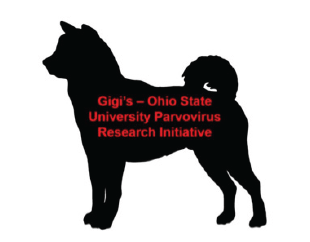Innovative Spectrum of Care clinical trial

Article by: Allison Burk
Originally Published
Innovative Spectrum of Care clinical trial could provide effective and affordable treatments that could improve outcome of dogs with parvovirus. Researchers at The Ohio State University College of Veterinary Medicine, in partnership with Gigi’s, are aiming to improve the life of shelter dogs through the advancement of treatment for canine parvovirus.
A major component of the spectrum of care concept is having a variety of treatment options that consider evidence-based medicine available for pet owners while remaining responsive to client expectations and financial limitations.
Research projects conducted by The Ohio State University College of Veterinary Medicine faculty evaluate different treatment and diagnostic modalities that could result in less expensive options for a veterinarian to present and provide to a pet parent or animal owner.
An example of innovative research that has the ability to broaden the spectrum of care opportunities is the Gigi’s-Ohio State University Joint Parvovirus Research Initiative. The Ohio State University College of Veterinary Medicine, in collaboration with Gigi’s, a nonprofit organization dedicated to improving the lives of shelter dogs, recently launched an initiative to accelerate research to improve treatments for dogs suffering from canine parvovirus. The goal of the research is to identify new treatment strategies to save the lift of more dogs infected with canine parvovirus.
Canine parvovirus is highly fatal without treatment and current effective treatment options are very costly. This financial barrier prevents many dog owners and shelters from treating the disease. Other treatment options are being used but have not been well studied. The Gigi’s-Ohio State University Joint Parvovirus Research Initiative hopes to find new ways to address this problem because effective treatments can save most of these patients.
Led by co-principal investigators Jenessa Winston, DVM, PhD, DACVIM, assistant professor in the Department of Veterinary Clinical Sciences, and Jeanette O’Quin, DVM, MPH, DABVP, DACVPM, assistant professor in the Department of Veterinary Preventive Medicine at Ohio State’s College of Veterinary Medicine, the Gigi’s-Ohio State University Joint Parvovirus Research Initiative launched January 15, 2021 and runs through January 15, 2024.
“In collaboration with Gigi’s, we aim to establish a unique interdisciplinary canine parvovirus research hub, with the intention to develop future canine parvovirus knowledgeable scientists and veterinarians and execute clinically relevant research projects targeted for implementation in shelters as well as other resource-limited settings,” said Winston.
The first phase of this research consists of two stages. In stage one, investigators from the Ohio State’s College of Veterinary Medicine and Gigi’s will create a repository of samples (blood, urine and feces) and clinical information from dogs suffering from canine parvovirus enteritis.
The second stage will include two clinical trials focused on addressing the efficacy and cost-effectiveness of two treatment options. First, determining the clinical efficacy and financial feasibility of fecal microbiota transplantation (FMT) as an adjunctive therapeutic option for dogs suffering from canine parvovirus enteritis in a shelter setting. The second is to determine the impact of various fluid therapy delivery methods on clinical outcomes of canine parvovirus-infected dogs in a shelter setting.
“If this research initiative leads to finding effective treatment options that cost less money and require less intensive medical care, this could allow more animal shelters and pet owners to treat dogs that develop canine parvovirus successfully,” said O’Quin.
O’Quin says her hope is that this will spark interest in other researchers to reevaluate current treatment options for this and other common diseases.
“This extension of our research and education partnership with Ohio State’s College of Veterinary Medicine aims to deliver unprecedented treatment options to dogs suffering from this deadly disease to save even more shelter dogs,” said Colleen Shockling, DVM, MPH, co-principal investigator, director of education, outreach and the Parvovirus Treatment Center at Gigi’s. “Gigi’s provides high-quality, free, veterinary care to rural shelter dogs that would otherwise not receive it.”
This research is made possible through the generous support of George and Tina Skestos via funding from the IHS Foundation.
“We are so proud to partner with the Ohio State College of Veterinary Medicine in this Gigi’s-Ohio State Joint Canine Parvovirus Research Initiative. We value this multidisciplinary team-based collaborative approach helping address this all-too-common problem, especially in shelters and other resource-limited environments,” said George and Tina Skestos. “Our collective goals are to improve the health, wellbeing and survival of these and other dogs in shelters/humane societies and to find them loving pet parents and forever homes. No dog left behind.”
“Identifying and demonstrating clinical efficacy and cost-effectiveness of treatments for canine parvovirus and other diseases common in pet dogs and those in shelters is in alignment with our focus on a spectrum of care approach to veterinary medical education and patient care. This approach addresses the growing problem of affordability of veterinary care by providing a continuum of acceptable care that considers available evidence-based medicine, client expectations and financial limitations, thereby successfully serving an economically diverse clientele,” said Rustin Moore, DVM, PhD, DACVS, dean of Ohio State’s College of Veterinary Medicine and Ruth Stanton Chair in Veterinary Medicine.
One of the foundational principles of the college’s Be The Model® strategic plan is advancing partnerships. This collaboration between Gigi’s and The Ohio State University College of Veterinary Medicine is a prime example of the mutual benefit of working together to address common goals.